Emmanuel Macron has set his mind to imposing tougher rules on the worlds biggest tech companies, and he plans to use next years European election to move his agenda forward, a minister and top officials told POLITICO.
The French president is the driving force behind controversial plans to impose a revenue tax on companies like Google and Facebook, and hes an ally of European Competition Commissioner Margrethe Vestager — the woman branded the EUs “tax lady” by Donald Trump — who last week slapped a €4.3 billion fine on Google over its Android mobile software.
Now Macron wants to press even more far-reaching regulations on Silicon Valley firms. Hes eyeing the European Parliament election next May to establish a broad centrist voting bloc in Brussels that will help him weigh in on the Commissions agenda for 2019, with digital policy at the heart of his plans.
“We have to go farther than the European Commission has on this subject,” Macrons secretary of state for digital affairs, Mounir Mahjoubi, said in an interview. “The elections are an opportunity to speed things up. The European Parliaments first year has to go fast. Its the digital world … six months is a lot. We cant take three years.”
Macron has been a powerful advocate for other efforts to rein in Big Tech.
One part of the French presidents agenda has to do with regulating online behavior on platforms like Google, Twitter and Facebook. His government, flanked by EU allies, is already succeeding by getting the European Commission to put forward a law that would force platforms to take down terrorist content within a short timeframe, in what would mark a significant shift away from current voluntary schemes.
But Macron wants to go further, by upending the legal framework that currently underpins platforms in Europe and grants them limited liability over hosted content.
In this effort, which involves reopening Europes e-Commerce Directive, the 40-year-old is likely to run up against determined opposition from other EU countries, especially in the north and east, which tend take a more liberal view of tech regulation.
“We still havent had the right amount of discussion on this at the European level,” Mahjoubi added.
Les copains de Macron
France, which is the only EU country to have a law against fake news on its statute books, had a limited role in writing Europes General Data Protection Regulation, a sweeping revamp of privacy rules that came online in May, and subjects companies to much tighter rules for how they collect and process data.

Macron wants to make sure that the next Commission maintains the momentum on tech regulation | Remy Gabalda/AFP via Getty Images
Yet Macron has been a powerful advocate for other efforts to rein in Big Tech, not least via a French-led plan to impose a temporary turnover tax on digital giants that is now on the Commissions agenda and due for final review by the end of this year.
To press his influence with other governments, Macron relies on Finance Minister Bruno Le Maire to conduct high-level diplomacy. Mahjoubi, who was hoisted to his current role after running the president-to-bes digital campaign, has been more active lobbying the European Commission, frequently making the hour-and-twenty-minute train trip to Brussels to meet with top EU officials and stress French views on everything from the blocs artificial intelligence strategy to investment for startups. It never hurt that the blocs tax commissioner, Pierre Moscovici, is a former French finance minister who could amplify policy within the Commission.
“The connections … are already regular. With [Competition Commissioner Margrethe] Vestager and [Digital Vice President Andrus] Ansip — we write each other, we see each other very often … Im in Brussels once a month,” Mahjoubi said.
Macron has also found a cheerleader in Vestager, Europes most powerful commissioner. Within a digital project team in the Commission, shes pushed for tougher rules against fake news and a full-blown law against illegal terrorist content, along with Security Commissioner Julian King and First Vice President Frans Timmermans, according to three Commission officials.
That kind of high-ranking support has helped push antiterrorist content rules over the line. After months of being reluctant to draft legislation, the camp in favor of legislating is winning the day over longtime skeptics like Ansip, and Justice and Consumers Commissioner Věra Jourová.
Reopening the e-Commerce Directive is bound to set off a lobbying war in Brussels over how internet giants should be regulated, with no guarantee that the French will have their way over free-trading Northern EU nations.
Now Macron wants to make sure that the next Commission, which will be installed after next years Parliament election, maintains the momentum on tech regulation, as well other issues of interest to the French leader.
To lock down his influence in Brussels, Macron needs to make sure he has sufficient clout to weigh on commissioners nominations, an objective he can only achieve via a broad voting bloc in European Parliament. His centrist La République en Marche (LRM) party is at work forging alliances with like-minded groups in other EU countries, notably in Spain with the Ciudadanos party.
Army of opponents
But even as Macron — who founded his own party and swept to the French presidency in 2017 — sets his sights on EU digital policy, opponents are preparing to stare him down. Reopening the e-Commerce Directive is bound to set off a lobbying war in Brussels over how internet giants should be regulated, with no guarantee that the French will have their way over free-trading Northern EU nations.
“The [definition of a tech platform] is based on a delicate balance between players in the value chain, ensuring digital rights for everyone and vitality of innovation. Reopening the e-Commerce Directive would jeopardize this with an unpredictable result,” said Loïc Rivière, the managing director of TechinFrance, which represents startups and major internet giants.
The country still remains at odds with others on many issues, and Frances partnership with Germany, the EUs biggest economy, often fails to deliver legislative results.

Macron wants to press even more far-reaching regulations on Silicon Valley firms | Christophe Petit Tesson/AFP via Getty Images
“Overall, the French influence is bound to grow, but the more it will grow, the more we will realize that the British influence is missing and that the French-German alliance doesnt work as well as expected,” said Nicolas Colin, co-founder and director at The Family, an organization that works with startups in Paris.
Liberal countries like Sweden, Denmark and the Czech Republic will work particularly hard to counter Frances more technophobic influence, diplomats told POLITICO, especially as they look to make up for the absence of the U.K.s liberal sway after Brexit, supported by rising pressure from internet lobbyists to boot.
But if Paris doesnt get its way with the EU, its not afraid to go it alone.
“Every time we do a national project on digital, its because we missed something at the European level,” Mahjoubi concluded.










